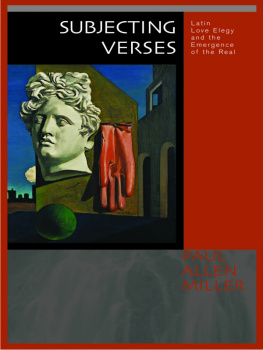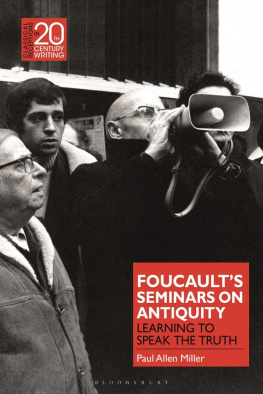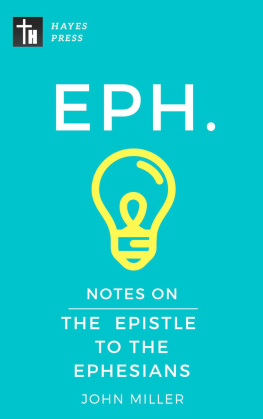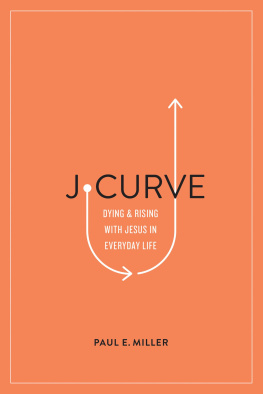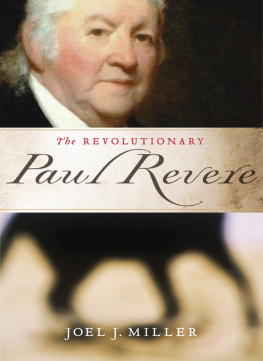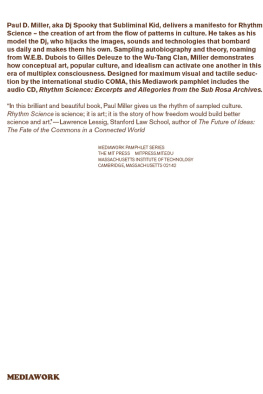Miller Paul Allen - Subjecting Verses
Here you can read online Miller Paul Allen - Subjecting Verses full text of the book (entire story) in english for free. Download pdf and epub, get meaning, cover and reviews about this ebook. year: 2009, publisher: Princeton University Press, genre: Religion. Description of the work, (preface) as well as reviews are available. Best literature library LitArk.com created for fans of good reading and offers a wide selection of genres:
Romance novel
Science fiction
Adventure
Detective
Science
History
Home and family
Prose
Art
Politics
Computer
Non-fiction
Religion
Business
Children
Humor
Choose a favorite category and find really read worthwhile books. Enjoy immersion in the world of imagination, feel the emotions of the characters or learn something new for yourself, make an fascinating discovery.
- Book:Subjecting Verses
- Author:
- Publisher:Princeton University Press
- Genre:
- Year:2009
- Rating:3 / 5
- Favourites:Add to favourites
- Your mark:
- 60
- 1
- 2
- 3
- 4
- 5
Subjecting Verses: summary, description and annotation
We offer to read an annotation, description, summary or preface (depends on what the author of the book "Subjecting Verses" wrote himself). If you haven't found the necessary information about the book — write in the comments, we will try to find it.
Subjecting Verses — read online for free the complete book (whole text) full work
Below is the text of the book, divided by pages. System saving the place of the last page read, allows you to conveniently read the book "Subjecting Verses" online for free, without having to search again every time where you left off. Put a bookmark, and you can go to the page where you finished reading at any time.
Font size:
Interval:
Bookmark:
Subjecting Verses
Subjecting Verses
LATIN LOVE ELEGY AND
THE EMERGENCE OF THE REAL
Paul Allen Miller
PRINCETON UNIVERSITY PRESS
PRINCETON AND OXFORD
Copyright 2004 by Princeton University Press
Published by Princeton University Press, 41 William Street,
Princeton, NewJersey 08540
In the United Kingdom: Princeton University Press, 3 Market Place,
Woodstock, Oxfordshire OX20 1SY
All Rights Reserved
eISBN: 978-1-40082-593-6
U.S. Library of Congress and British Library Cataloging-in-Publication Data is available
This book has been composed in Sabon
Printed on acid-free paper.
www.pupress.princeton.edu
Printed in the United States of America
1 3 5 7 9 10 8 6 4 2
To Annie, Omnia vincit amor
CONTENTS
ACKNOWLEDGMENTS
THIS BOOK has been eight years in the making. I fear that I shall almost certainly forget to thank one of the countless people who have read drafts of various chapters. Special debts of thanks are owed Micaela Janan and Sharon Diane Nell, who read the whole manuscript from cover to cover and provided numerous comments, suggestions, and much needed criticisms. Judith Hallett as one of my readers for Princeton did me invaluable service, and the entire book has been much strengthened by her exacting and detailed criticisms. At various points during the books composition, chapters have been read and responded to by a wide a variety of friends and colleagues: Chuck Platter, David Larmour, Ralph Johnson, Marilyn Skinner, Sharon James, Ellen Greene, TimMoore, Douglass Parker, David Wray, AndrewCousins, David Oberhelman, and Wayne Rebhorn. To each of you, I owe a special debt of thanks. I also most gratefully acknowledge the classics departments at the University of Texas at Austin, the University of Georgia, Boston University, the University of Chicago, Duke University, and Notre Dame University for allowing me to present the results of my ongoing research to them. Lastly, this book could not have been written without the assistance of a sabbatical leave in the spring of 1997 from Texas Tech University that allowed me to start writing in a serious fashion and a College of Liberal Arts Scholarship Support grant from the University of South Carolina in the summer of 2001 that allowed me to complete my first draft.
I owe special thanks to my teachers, Barbara Gold, Carl Rubino, and Kevin Herbert, who taught me to love this poetry and the adventure of intellectual inquiry. A debt of gratitude is also owed to my parents, Joe and Mary Miller, who have offered me unwavering support in all my endeavors, to Ann who puts up with me no matter what, and to Sam who is five-years-old today. Happy birthday, buddy!
A portion of an early draft of chapter 1 appeared in Towards a PostFoucauldian History of Discursive Practices, Configurations 7 (1999): 21155 The Johns Hopkins University Press and is reprinted with permission of Johns Hopkins University Press. Portions of chapter 4 were published in The Tibullan Dream Text, Transactions of the AmericanPhilological Association 129 (1999), 181224 ohns Hopkins University Press and are here reprinted with the permission of Johns Hopkins University Press. The first three sections of chapter 5 appeared in Why Propertius Is a Woman: French Feminism and Augustan Elegy, ClassicalPhilology 96 (2001): 12746. Copyright () 2001 by University of Chicago Press. They are reprinted here with the permission of the University of Chicago Press.
November 4, 2002
Columbia, S.C.
Subjecting Verses
Chapter One
TOWARD A NEW HISTORY OF GENRE:
ELEGY AND THE REAL
It seems to me rather that we have to look at failures of
form,the impossibility of certain kinds of representation
in a certain context,the flaws,limits,obstacles,which
become the clue to the social truth or social meaning.
Jameson 1998: 361
It can often be the emphasis on the impossibility of
representation that gives the clue and organizes things.
Jameson 1998: 369
THE PURPOSE of this book is to provide a history or genealogy of the Latin love elegy. That history is problematic and demands a more comprehensive explanation in part because it is so short. Many books have already treated the form,and in recent years several have offered exciting and sophisticated readings of its rhetoric and modes of characterization (Greene 1998; Kennedy 1993; Veyne 1988),but none has offered a convincing exegesis of this subgenres sudden flaring into existence and its just as sudden extinction. Indeed,most treatments have largely eschewed historical modes of reading,except for now outdated forays into the uncertain terrain of biographical criticism.
Latin love elegy first comes to light in the last years of Catulluss life, around 56 B.C.E. It effectively disappears with Ovids death in exile in 17 C.E. the last collection of love elegy to have any observable influence on subsequent literary history,then the entire genre,as an effective and authentic form of literary expression, can be said to have bloomed and died in a mere fifty years (Lee-Stecum 1998: 1618; Albrecht 1997: 744; Elia 1981: 7475; Boucher 1980: 34).
Of course,thi s does not mean that elegies ceased to be written. We continue to have references to occasional practitioners of elegiac verse later in the imperial period,b ut none of them merits appearance in Quintilians canonical list of the Roman elegists (10.1) or Diomedes the Grammarians fifth-century compilation (1.484) or had any recognizable influence on the literature of his day (Ross 1975: 101; Boucher 1980: 164). Thus,P liny the younger mentions a nephew of Propertius (Epistles 6.15.1, 9.22.12), but neither of them left either any substantial record of his work. The genres moment,it seems,had passed. The extreme tensions, which I argue constitute the elegiac subject position,no longer assumed the same forms. Erotic elegys extraordinary public dramatization of a private sphere that both engages socially constituted norms of individual conduct and insistently calls them into questionthe vital contradictions at the heart of its beingwere no longer able to find a place fromwhich they could be directly spoken. Those tensions were not so much resolved as displaced. The Ovid of the Tristia, as we shall see in chapter 8,cou ld only continue the discourse of elegy by speaking from the realm of the dead. What we see in him and those who come after is the specter of elegy rather than elegy proper. No longer possible is the overtly contradictory position of a Tibullus,w ho accepts a life of traditional martial virtue for his patron Messalla but rejects it for himself (1.1; see chapter 4); of a Propertius,who casts his love for Cynthia in terms recalling Antonys for Cleopatra while praising Caesars victory at Actium (2.15, 2.16; see chapter 5),or of an Ovid,w ho simultaneously invokes the power of ius while proposing stratagems of adultery (Amores 1.4; see chapter 6). The ideological space required for this type of openly split subject is no longer available (Boucher 1980: 3435).
Instead,we see a new model emerge in which the subject is always already absent from view,speaking from nowhere,from a place beyond the contingencies of the here and now (Newman 1989: 1501). Persius under Nero digs a grave (scrobis) in which to tell the truth and bury it (1.11920). Juvenal under Trajan dares only speak of (and thus effectively from) the dead (1.17071). The position of the speaking subject has changed in a fundamental way (Auerbach 1965: 24748; Foucault 1984: 105; Henderson 1993: 130; Edwards 1993: 32). As Shadi Bartsch demonstrates in her reading of Tacituss Dialogus de Oratoribus,the place that was once the republican orators,addressing the people in pro
Next pageFont size:
Interval:
Bookmark:
Similar books «Subjecting Verses»
Look at similar books to Subjecting Verses. We have selected literature similar in name and meaning in the hope of providing readers with more options to find new, interesting, not yet read works.
Discussion, reviews of the book Subjecting Verses and just readers' own opinions. Leave your comments, write what you think about the work, its meaning or the main characters. Specify what exactly you liked and what you didn't like, and why you think so.

